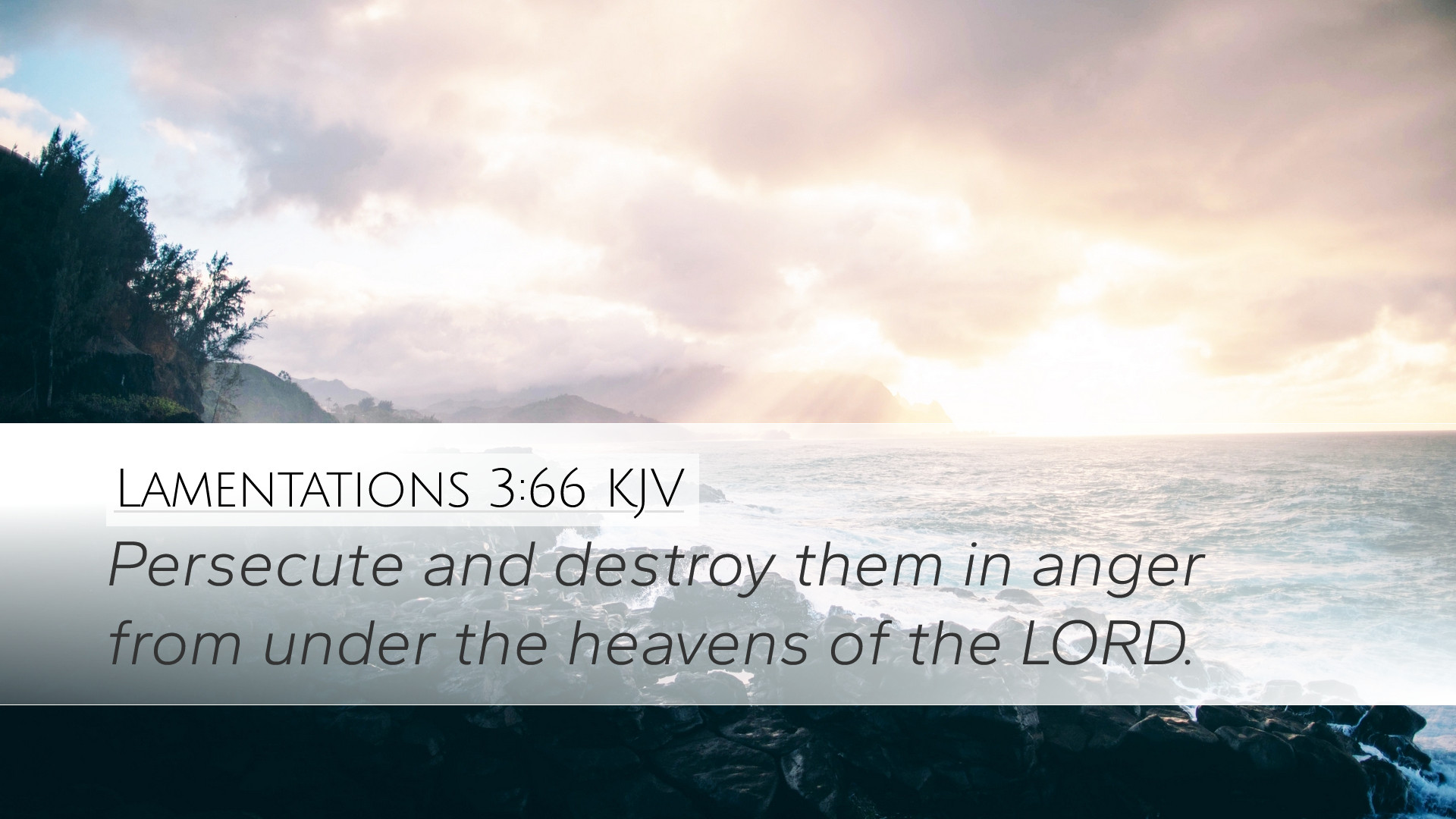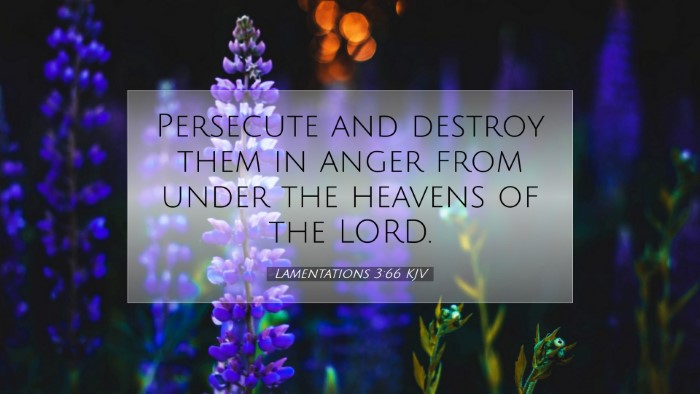Lamentations 3:66 - Commentary Overview
Verse Text: "Persecute and destroy them in anger from under the heavens of the Lord."
Introduction
The Book of Lamentations, traditionally attributed to the prophet Jeremiah, is a profound expression of sorrow and reflection on the destruction of Jerusalem and the suffering of its people. In this context, Lamentations 3:66 serves as a poignant plea that encapsulates the anguish of the Israelites as well as their call for divine justice. To understand its depth, we draw upon insights from esteemed public domain commentaries.
Exegesis of Lamentations 3:66
The verse can be understood as a culmination of the themes of lament and retribution that permeate the text. Jeremiah, as both a prophet and a witness to the devastation, articulates a desire for God's divine retribution against those who have wronged His people.
Matthew Henry's Commentary
Matthew Henry posits that this verse reflects the intense longing for judgment upon the oppressors. He emphasizes that:
- The call for persecution and destruction signifies not merely vengeance but a plea for God’s justice to prevail against adversaries who have inflicted pain on the faithful.
- Anger from God is portrayed as righteous; it indicates the seriousness of sin and the necessary cleansing that must occur.
- Heavenly perspective: Henry indicates that the reference to heaven underscores the sovereignty and authority of God in executing divine judgment.
Albert Barnes' Commentary
Albert Barnes provides a theological lens through which to view this cry for divine action:
- The significance of 'persecute' reflects the deep-seated need for justice. Barnes notes that such language can be seen as invoking the covenant faithfulness of God to uphold the oppressed.
- Destruction as sanctification: Barnes argues that destruction here is necessary for the restoration of God’s people, suggesting that through divine punishment, the people may one day return to their covenantal relationship with God.
- From under the heavens highlights the omnipresence and authority of God and serves as a reminder that all nations are subject to His judgment.
Adam Clarke's Commentary
Adam Clarke’s analysis offers a more personal reflection on the verse:
- Clarke elucidates the emotional weight of Jeremiah's plea, indicating that it exhibits the heart of a wounded leader crying out for vindication.
- The plea for punishment not only shows desolation but also a desire for the eventual rectification of justice and the restoration of hope for God's people.
- The expression of anger can be synonymous with hope, as it suggests a belief that God will not remain indifferent to injustice.
Theological Implications
The verses leading up to this statement encapsulate a profound cycle of suffering intertwined with a yearning for justice. The theological implications of Lamentations 3:66 extend into our understanding of God’s nature as just, merciful, and sovereign:
- The justice of God: This verse acts as a reminder that God's justice is both inevitable and ultimate. It reassures believers that their pain is not overlooked.
- The human condition: Reflecting on suffering brings us into deeper communion with the human experience. This verse embodies the raw emotions tied to grief and loss.
- Covenantal faithfulness: There is an implicit hope that suffering will lead to restoration, underscoring the belief that even in turmoil, God remains steadfast in His promises.
Practical Applications
The reflection on Lamentations 3:66 invites believers to consider several practical aspects:
- Understanding anguish: Pastors and counselors can draw from this verse to help congregants articulate their suffering while holding on to faith.
- Preaching on justice: This verse can serve as a powerful foundation in sermons focused on God’s justice, emphasizing that divine retribution is part of God’s righteous character.
- Encouraging prayer for vindication: Believers are encouraged to bring their cries for justice to God, mirroring Jeremiah’s plea.
Conclusion
Lamentations 3:66 stands as a striking verse within the broader lament of Jerusalem’s destruction, encapsulating themes of persecution, anger, and the hope for divine justice. The insights derived from Matthew Henry, Albert Barnes, and Adam Clarke deepen our understanding while highlighting the emotional and theological depth present in this poignant scripture. As believers reflect upon this verse, may they be reminded of God’s unwavering justice and ultimate plan for restoration.


